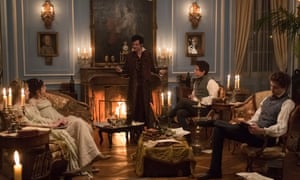Mary Shelley review – Elle Fanning plays the innocent while making a monster
Peter Bradshaw
Friday 6 July 2018
H
aifaa Al-Mansour is the Saudi Arabian film-maker whose 2012 debut feature Wadjda was the first to be shot entirely in her home country and so far the only Saudi picture to be directed by a woman. So she is an interesting choice to take on this script from first-time screenwriter Emma Jensen, about the life of Mary Shelley, author of the 1818 classic Frankenstein, famously arrived at after a kind of competition, or dare, between Mary, her soon-to-be husband Percy Shelley and Lord Byron, as to who could create the scariest tale.
 |
| Douglas Booth and Elle Fanning in Mary Shelley. Photograph: Curzon Artificial Eye |
Mary was a woman working in a man’s world, creating an entirely new genre of writing and moreover one in a brutal and audacious and stereotypically male style. It was a thrilling story that tackled the themes of abandonment, cruelty, arrogance, the limits of knowledge and the nature of creation. And all of this was thoroughly gendered, as nobody used to say in 1818. (In fact, there are some slight anachronistic touches here, people saying “gender” instead of the plainer “sex”, and using phrases such as, “I have no problem with it.”)
Elle Fanning has a pertly innocent serenity in the role of Mary, and her insouciant poise carries this robustly watchable, if basically rather undemanding drama. She always has an air of defiance and impregnable purity, delicate prettiness and granite integrity: someone untouched by any of the physical or moral squalor in which she happens to find herself. She was rather similar in Nicolas Winding Refn’s horror film The Neon Demon.
Douglas Booth is her lover, and later husband, a distinctly epicene and conceited Percy Bysshe Shelley, and Tom Sturridge is outrageously over the top as Lord Byron, giving vent to declamations such as: “I’m going to go riding! I need something thick between my legs!” (That’s a line that Mel Brooks might have written for his own masterpiece, Young Frankenstein.) Byron certainly seems to be mad, bad, dangerous to know, and also a great user of kohl and eyeliner as if appearing in a lost, gothic video for Duran Duran. Bel Powley refuses to be upstaged in the thankless role of Mary’s sister and Byron’s lover Claire Clairmont. Stephen Dillane brings something gloomy, thoughtful and saturnine to the role of scholar and bookseller William Godwin, Mary’s father and the widowed husband of feminist campaigner Mary Wollstonecraft.
The drama as Jensen conceives it is perhaps more parochial and interior than other treatments might have been. There are no grand European journeys, nothing showing Mary in Germany, near where the actual Frankenstein castle was to be found and in which alchemical experiments were thought to have taken place. A more playful or whimsical script might have imagined Shelley seeing the castle, maybe even knocking on the door and being admitted by a bowed and sinister servant, prior to having a quick look round in the interests of research.
The drama as Jensen conceives it is perhaps more parochial and interior than other treatments might have been. There are no grand European journeys, nothing showing Mary in Germany, near where the actual Frankenstein castle was to be found and in which alchemical experiments were thought to have taken place. A more playful or whimsical script might have imagined Shelley seeing the castle, maybe even knocking on the door and being admitted by a bowed and sinister servant, prior to having a quick look round in the interests of research.
This is a story bound by the British Isles. A young Mary goes on a journey to family friends in Scotland, where she is first to make the acquaintance of Percy Shelley, then a headstrong young poet with little published. Back in London, she endures genteel poverty, and then ungenteel poverty once she has run away with Percy, and then a miraculous promotion to what looks like wealth in the Jane Austen-ish environs of Bloomsbury. But it becomes horribly clear that reckless and irresponsible Shelley is paying for everything with borrowed money. So, apart from anything else, Mary learns something that appears to have escaped her unreliable lover: that a professional writer pays his – or rather her – way.
Sometimes, it feels like a soap opera, and sometimes also like a very serious episode of Blackadder, perhaps inevitably, given the big performances, Regency costumes and the boyband-Byronic hairstyles for the young bucks. Yet none of that takes away from the storytelling gusto and acting quality. This is a film that emphasises not the horror of the Frankenstein story, but its pathos and pity: the creature that is deeply lonely and unhappy, burdened with a life it didn’t want.
Jensen and Al-Mansour allow you to absorb the paradox: the novel (and a whole new pop-culture industry stretching into the next two centuries) is what Mary Shelley created, galvanising ideas, zapping life into words and paper. But she didn’t abandon her creation. On the contrary, a male literary world showed every sign of wanting to take it away from her. Fanning holds the screen as someone intent on writing her own destiny.




No comments:
Post a Comment